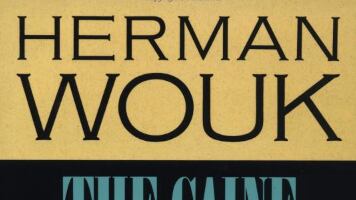The Caine Mutiny is one of the greatest novels ever written about a dysfunctional workplace. Ever had a petty and vindictive boss, competent only at deflecting blame for his own shortcomings? Or a colleague who grumbles about office shortcomings, only to go cringingly silent when superiors are listening? Have you ever damaged your own career by doing your job too well, annoying and embarrassing the people around you? If so, you'll feel immediately at home aboard the USS Caine.
Of course, the work environment described in The Caine Mutiny is no ordinary one. It's the US Navy in World War II, and the Navy ("a machine invented by geniuses, to be run by idiots") is the book's true hero. Wouk is a modern writer in his style and methods, but in his outlook on war, he has more in common with John Greenleaf Whittier and Alfred Lord Tennyson than with the writers of his own era. Wouk takes for granted - not only the rightness of the war's cause - but also the worth and merit of the warriors. One of the early warnings of the impending treachery of Tom Kiefer (the officer who will encourage the mutiny and then flinch from accepting responsibility) is that he's at work on a novel that mocks his naval superiors.
Wouk knows intimately the defects of naval superiors, and he vividly displays them: the admiral who spends the war enjoying the comforts of life in Pearl Harbor (splendidly described); the martinet commander of one of the Caine's companion vessels who bullies and terrorizes his subordinates; capable but slovenly captain of the Caine itself; and of course the epic character of Captain Queeg himself. But Wouk wants it understood. Modern wars are not won by the unaided efforts of heroes and geniuses. They are won by systems, and in that system everybody plays his part, including, yes, even the Queegs.
The Caine's war was mostly a boring war. It was a cramped and uncomfortable war. But it was also a strangely quiet and affluent war. Even those who have not read the book know its most famous scene: the meeting summoned by Captain Queeg in the middle of the night to discover who ate the last of the ship's supply of frozen strawberries. But think of it again: strawberries! in the South Pacific! After one ship's supper, Keith reflects that there were worse places to spend the war than the Caine. Wouk is fully alive to the horrible irony of that thought. Yes, there were worse places. Almost all of them.
The Caine is finally decommissioned in the fall of 1945, after steaming its broken-down way home from Okinawa. On the New York docks, the book's protagonist, Willie Keith, gives a little speech. We have followed Keith's maturation from a callow, spoiled, and plump college boy into a man capable of an act of heroism - and then at last into the last captain of the Caine. Grandiose rhetoric fails Keith at this last moment. It's anyway inappropriate for this battered ship which saw action and danger on only very rare occasions through all the length of the novel. Keith wishes everybody well, and finishes with these words:
"We were all doing part of what had to be done to keep our country existing, not any better than before, just these same old country that we love. We're all landlubbers who pitted our lives and brains agains the sea and the enemy, and did what were told to do. The houses we spent upon the Caine were hours of glory. They are all over. We'll scatter into the trains and busses now and most of us will go home. But we will remember the Caine, the old ship in which we helped to win the war. Caine duty is the kind of duty that counts. The high-powered stuff just sets the date and pace of the victory won by the Caine."






